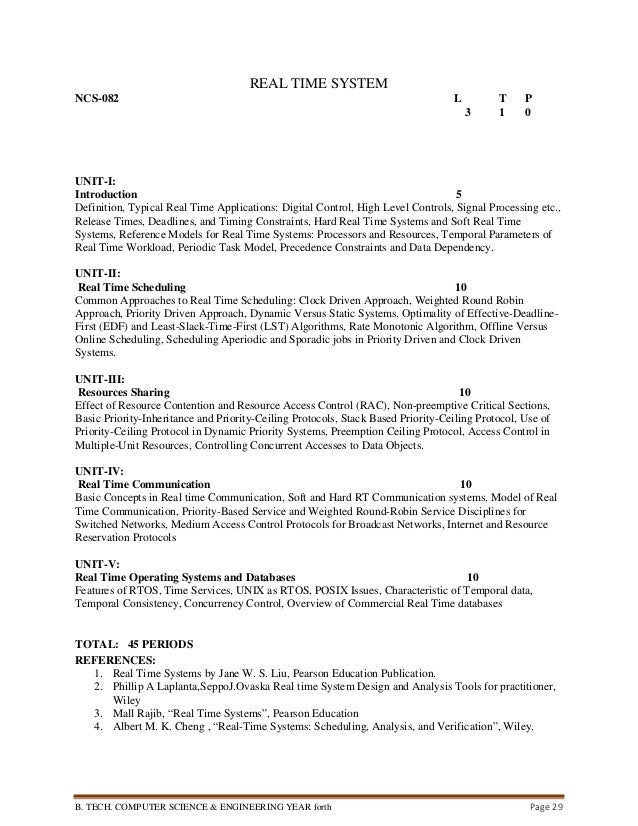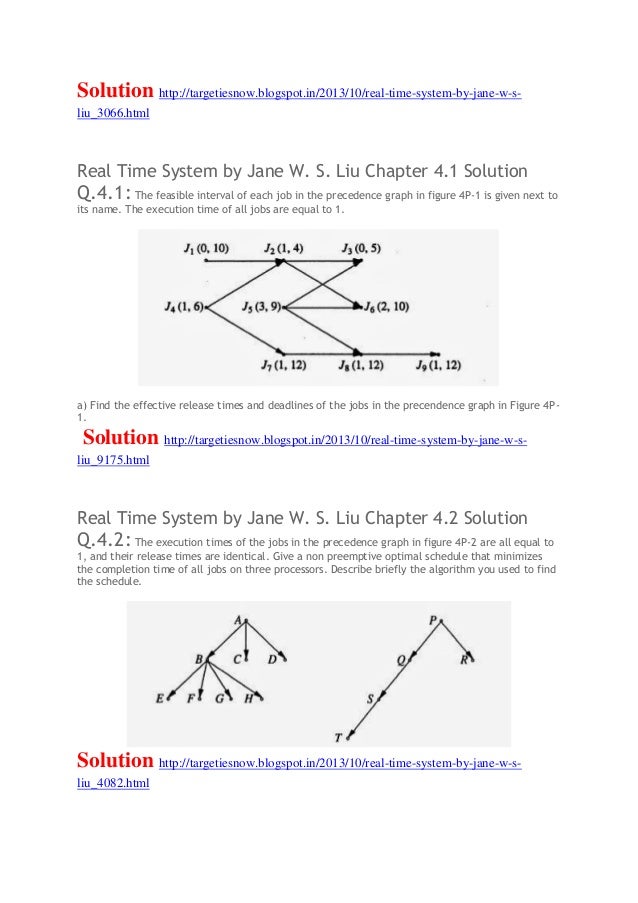- Real Time Systems (Jane W S Liu) Real Time Systems by Jane W S Liu Provides professionals and students with a comprehensive treatment of real-time computing and.
- Real Time System by Jane W. Liu Chapter 3.2 Solution Q.3.2: Consider the real-time program described by the psuedo code below. Names of jobs are.
Solution Manual for Real Time System by Jane W. Liu Real Time System by Jane W. Liu (Pearson), the book builds on the student's background.
It covers techniques for scheduling, resource access control, and validation that are, or are likely to be, widely used in real time computing and communication systems. Each algorithm, protocol, or mechanism is defined by pseudo code or simple rules that can serve as a starting point of implementation. With few exceptio ns, each scheduling algorithm is accompanied that your application will meet its real time requirement when scheduling according to the algorithm. Here, in next successive posts, I am going to post solutions for the same Text-book (Real Time System by Jane W. If you find any difficulty or wants to suggest anything, feel free to comment.:).
Because sporadic jobs may have varying release times and execution times, the periodic task model may b e too inaccurate and can lead to undue under utilization of the processor even when the inter release times of jobs are bounded from below and their executions are bounded from above. As an example, suppose we have a stream of sporadic jobs whose inter release times are uniformly distributed from 9 to 11. Their execution times are uniformly distributed from 1 to 3.
What are the parameters of the periodic task if we were to use such a task to model the stream?

The aim of the course is to introduce a special class of time-sensitive computer systems known as real-time systems whose behavior must satisfy timing-constraints (i.e. They are often embedded in safety-critical applications such as modern vehicles, process control, and traffic control etc, and therefore they are also known as embedded systems. In particular, the 5hp course variant covers these topics:.
Real-Time Operating Systems. Real Time Programming Languages. Scheduling Theory and Resource Management.
Worst-Case Execution Time and Response Time Analysis. Real-Time Communication and Distributed Systems The 10hp course variant additionally covers the following advanced topics:.
Multiprocessor systems. Design and Validation (Modeling, Verification and Testing). Fault Tolerance and Recovery Course Material.
Literature., Alan Burns and Andy Wellings, Addison Wesley, 2001., Giorgio Buttazzo, Springer, 2005. Liu, Prentice Hall, 2000. Slides The slides used in the lectures will be made available during the course and linked on the.
Recommended Reading. In the text book by Giorgio C Buttazzo:. Chap 1 - 5, 7.1-7.4. Chap 9.1-9.6.
Chap 11. In the text book by Jane W. Liu:. Chap 1: read through. Chap 2: read all sections.


Chap 3: read 3.1-3.4 and read through 3.5-3.9. Chap 4: read all sections except 4.8.
Chap 5: read all sections. Chap 6: read all sections. Chap 7: read through all sections except 7.4, 7.8 and 7.9. Chap 8: read all sections except 8.9 and 8.10. Chap 9: read all sections except 9.7. Chap 12: read 12.1-12.3. In the text book by Burns and Wellings:.
Hermann Kopetz
Chap 1, 5, 6, 7, 12, 13 Lab assignments. The course offers four lab assignments. They are described in detail on their corresponding pages:.
For each lab assignment, you need to hand in a report. You need to get a 'passed' on all reports. Presence during lab hours is optional but highly recommended. Deadlines: Each lab has a deadline and you should hand in your report before the deadline. Hand-ins after the deadline will still be graded, but won't get any bonus points (see below) and are checked with much lower priority. However, after 1.12., we do not grade any hand-ins anymore.
You will have to wait until the next course in autumn next year. Please take this seriously. Bonus points: Depending on the quality of your report, you can get up to 5 bonus points for each lab, to be added to your exam result (which otherwise has max. This only holds for your first hand-in for each lab that is on time. I.e., you won't get any bonus for late hand-ins (after the deadline) nor any additional bonus for re-hand-ins (because of 'komplettering'). The results of your hand-ins will be posted on the page.